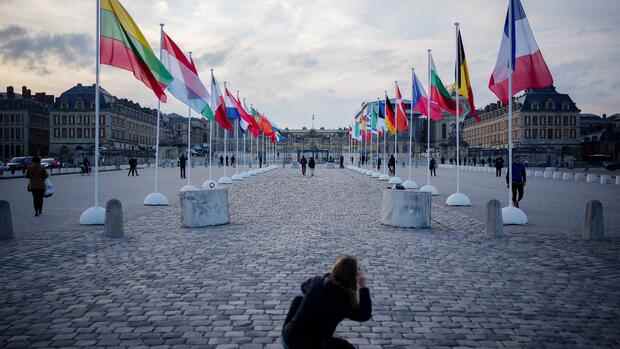Brussels, Paris In his letter to the European heads of state and government, EU Council President Charles Michel describes the drama of the current situation in the very first sentence: “Russia has brought the war to Europe,” says the invitation to the informal EU summit. In Versailles, France, the EU leaders want to discuss the consequences of Russian aggression on Thursday and Friday.
Improving defense capability, reducing energy dependency on Russia and strengthening the economic base – these are the goals Michel specifies.
But just before the big summit, the first cracks appear in the united front. Old controversies resurface.
On the one hand, there is disagreement about whether the EU should welcome Ukraine with open arms. The country had recently officially applied to join the Union.
Eastern Europeans in particular are urging to send a clear signal of solidarity to Kyiv and to reaffirm Ukraine’s European perspective by confirming the country as an official candidate country. Other member states, including Germany, advocate caution.
Common fund as a point of contention
One concern is that the EU could block the scope for a solution to the conflict. So far, the Kremlin has made Ukraine’s neutrality a condition for a ceasefire.
In addition, a debt debate is raging: Brussels is considering a joint fund to cushion the economic consequences of the war. The first thing that circulated was the proposal to set up a new credit line based on the model of the European short-time work program “Sure” in order to advance the energy transformation. But even within the joint projects, the EU Commission, which is actually always open-minded, met with skepticism.
Faced with the Russian invasion, Michel is pushing for common solutions.
(Photo: AP)
The next idea was even more ambitious: The EU could take on joint debt to finance urgently needed investments in the areas of defense and energy – along the lines of the “Next Generation EU” recovery fund launched during the pandemic.
Both proposals, top officials in Brussels suspect, were deliberately launched by France. French President Emmanuel Macron is campaigning and wants to present himself as the designer of a new, well-fortified Europe.
The French President is in the middle of an election campaign.
(Photo: dpa)
The dissatisfaction with the French profiling attempts is considerable in Austria and Denmark, among others. The debate is also extremely inconvenient for the federal government.
The French government has officially said: “No comment.” But the French are going into the debate with confidence, and Paris feels vindicated by the war on key economic policy issues. France has been warning of the risks of dependence on raw materials for years.
Unlike Germany, the government is not relying on gas for the energy transformation, but on nuclear power. President Emmanuel Macron announced in early February that up to 14 new nuclear reactors would be built.
Le Maire: French position will lead to rethinking
French Finance and Economics Minister Bruno Le Maire said in a speech on Wednesday that Paris had been the “motor of several conceptual revolutions” in Brussels in recent years, for example in state aid or industrial policy. The French position in Europe will also lead to a rethink on the energy issue.
Le Maire once again criticized the impact of gas prices on electricity costs in Europe. “A European energy market in which the price of electricity remains linked to the price of fossil fuels is absurd,” he said.
The rules urgently need to be changed so that electricity prices are based on the production costs of emission-free energy – which France includes nuclear power, which Germany spurned.
The federal government, on the other hand, is sticking to the attitude it has been taking for months: it is just as skeptical about a comprehensive electricity market reform as it is about plans for new community bonds. According to German government circles, the “EU borrowing must remain a one-time affair, as agreed.
Dutch Finance Minister Sigrid Kaag sees it similarly: “It is important for us that the Commission first uses the existing instruments and that the money that has not been called up is used,” she recently told the Handelsblatt.
>>Read more about this: “Exclude more banks from Swift”: Dutch finance minister calls for tougher sanctions on Russia
In a draft of the final declaration for the summit, the EU tries to artfully circumvent the differences of opinion. “Confronted with increasing instability, strategic competition and security threats, we have decided to take greater responsibility for our security and take further decisive steps to build our European sovereignty, reduce our dependencies and design a new growth and investment model for 2030” , the document says. It is available from the Handelsblatt.
However, the clear signal of unity that was supposed to be sent from Versailles is in danger of being clouded by the controversy surrounding the energy transition and financial policy.
More: EU debates new collective debt – to become independent from Russia
